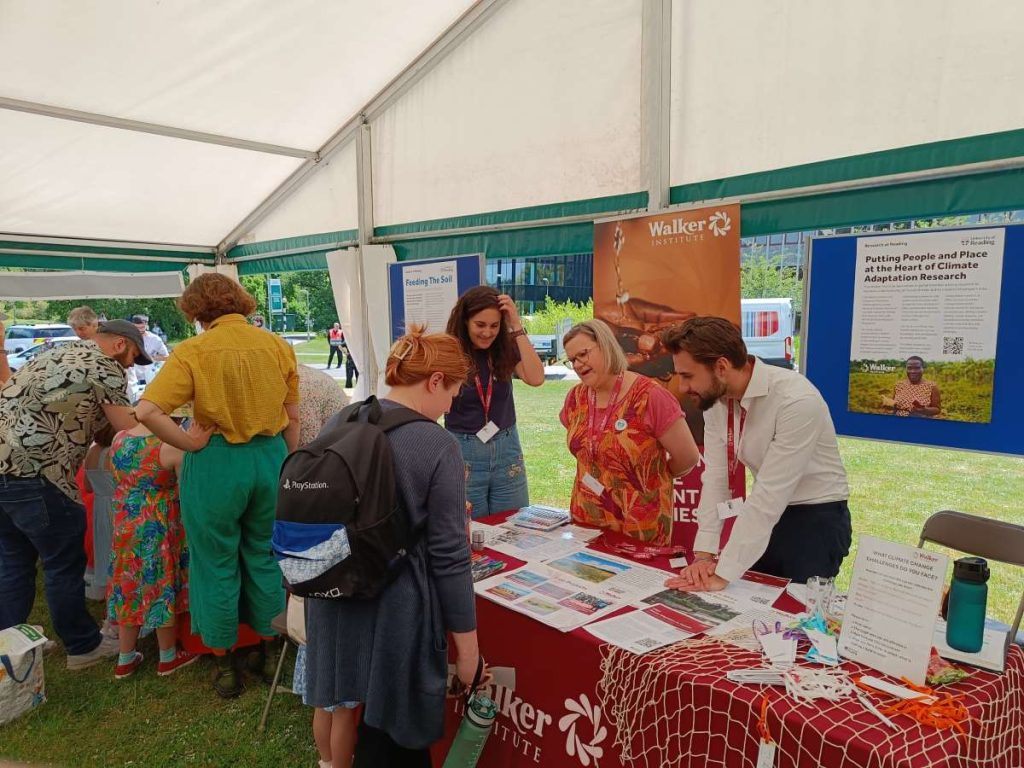
On a bright Saturday in May, the Walker Institute hosted a stand at the Community Fair 2025, inviting attendees to reflect on a pressing question: What is your climate risk? The responses we received were as diverse as the people who shared them, offering a powerful snapshot of how individuals perceive and experience climate change in their daily lives.
Ready for the Challenge: The “Green” Respondents
A small but confident group of participants expressed readiness to face climate challenges head-on. Valerie, a meteorology student, highlighted the structured climate policies in Botswana, such as its Nationally Determined Contributions (NDCs) under the Paris Agreement. Yet, she also pointed out a critical gap—public awareness. Mazel took a more personal approach, linking climate action to lifestyle choices like quitting smoking. These responses show that readiness can stem from both systemic policy engagement and individual behavioural change.
Taking Action: The “Orange” Majority
Most respondents fell into the “Orange” category—aware of the issues and actively taking steps to adapt. Their concerns ranged from urban overheating and surface flooding to plastic pollution and meat-related emissions. Many shared practical actions: reusing materials, recycling, reducing travel, and advocating for plant-based diets.
Some, like Wendy, voiced concern for vulnerable populations globally and emphasized the need for stronger leadership. Others, like Marven and Richard, highlighted the tension between environmental ideals and economic realities, such as the high cost of public transport. This group reflects a growing consciousness and willingness to act, tempered by the complexities of real-world constraints.
Feeling Powerless: The “Red” Respondents
For some, the climate crisis feels overwhelming and insurmountable. These “Red” responses conveyed a sense of urgency and helplessness. Ramazon pointed to water scarcity driven by population growth, while George listed a cascade of interconnected issues: rising temperatures, sea levels, costs, and biodiversity loss.
Leshan’s stark comment—“Humans won’t change in time”—echoed a deep pessimism that underscores the emotional toll of climate anxiety. These voices remind us that awareness alone isn’t enough; without resources, support, and systemic change, many feel stuck in the face of escalating risks.
Uncertain and Unaware: The “Purple” Voices
A few participants admitted they weren’t sure what climate risks they faced. Their responses, though less detailed, were no less important. Evie mentioned littering, while another participant worried about animals losing habitats due to melting ice. Sandra’s mention of global warming suggests a need for clearer communication and education.
These responses highlight a crucial gap: not everyone has access to the knowledge or tools to understand climate change, let alone act on it. Bridging this gap is essential for inclusive climate resilience.
What We Learned
The Community Fair 2025, organised by the University of Reading, offered more than just a collection of opinions—it revealed a spectrum of climate awareness, action, and anxiety. From confident changemakers to those still searching for answers, every voice added depth to our understanding of how climate change is lived and felt at the community level.
As we move forward, these insights will help shape more inclusive, responsive, and empowering climate strategies. Because real change starts with listening—and acting—together.

